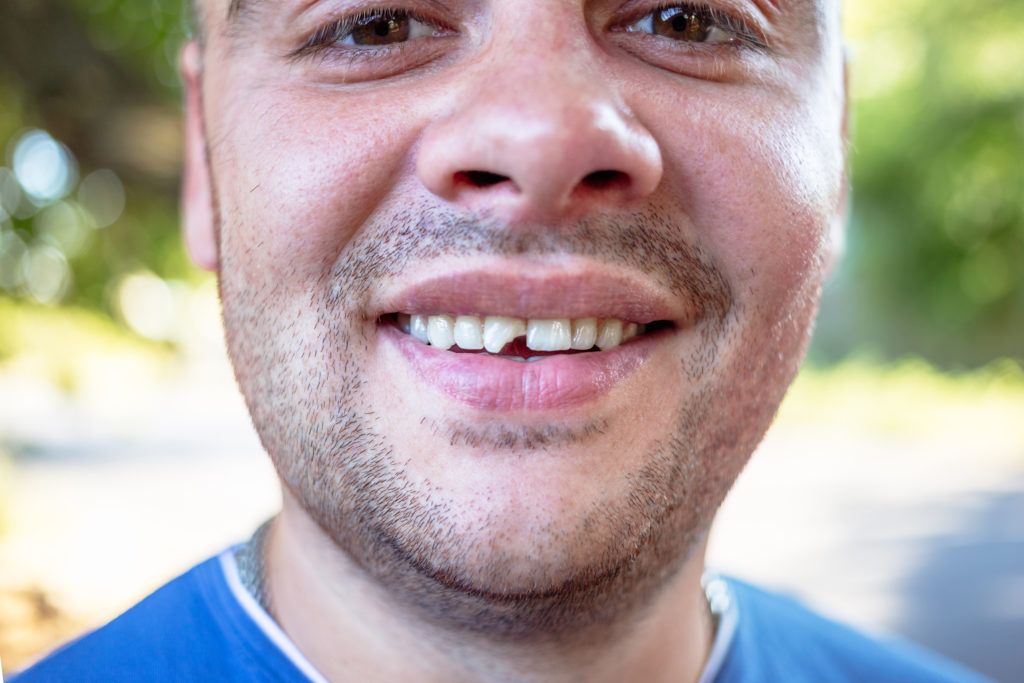Why spend money on Chipped tooth repair?

Learn why it’s important to fix a chipped tooth and how spending money on chipped tooth repair can save you pain, time, and money on a future repair.
Table of Contents
Whether you tried to bite directly into the world’s hardest candy, took a hockey puck to the face, or even toppled down a flight of stairs, it seems you’re here because you ended up with a chipped tooth. While your smile may not be what it’s all cracked up to be at the moment, you will have multiple options to fix or repair your chipped tooth. It’s important to note that repairing your chipped tooth will save you pain, time, and future issues requiring more appointments in the future. In the meantime, while you wait to see your dentist, here are some things you can do—wash the area surrounding the chipped tooth with mouthwash and make sure no small pieces that could possibly fall are still attached, or loose in your mouth where you could bite down on or swallow them. Feel free to use over-the-counter pain medication or ice for any pain or sensitivity in the area.
How to Fix a Chipped Tooth?
1. Veneers
Veneers are a great option for fixing a chipped tooth when the chip is larger. Veneers are porcelain covers that are placed over the affected tooth. Luckily for you, veneers look super realistic, so it would be pretty hard for anyone to tell that you have a new tooth (or teeth). A big plus is how long they last, which can be up to 20 years!
2. Crowns
Similar to veneers, as they are also made out of porcelain, crowns surround your chipped tooth helping visually cover your chip and physically covering it. This protects the tooth from being damaged further and covers any nerves that have been exposed from the area of your chipped tooth.
3. Bonding
Bonding is the preferred method for smaller chips. It’s a simple method of using resin to make a mold of the chipped area of your tooth. Then using the mold, your dentist can fill in the chipped area to create a natural look so your smile will be as good as new. This will be the quickest and most affordable method.
4. Dental Implants
This is the best option for the most severe chips and breaks. A procedure for when little to no tooth remains in your gum. Your dentist would remove the remains of your damaged tooth and then give you time to heal. Once healed, a metal post will be inserted in your jawbone through the gum, so your dentist can attach a tooth implant to the post. The implant will feel and look like a real tooth and will also last a lifetime. Since this is an advanced procedure that requires a healing period, this will be the most time-consuming method for repairing your tooth.
Why Is It Important to Fix or Repair a Chipped Tooth?
Looks aside, in most cases, it’s important to get a chipped tooth repaired. A chipped tooth is more susceptible to decay, further damage, and other issues in the future. Enamel that protects your teeth can crack and wear off more easily due to the chip. In this case, you would be more likely to get cavities. It’s also important to protect the nerve inside of your tooth. A big chip could affect the function of the nerve inside your tooth (spoiler alert, this hurts a lot!) and may lead to you opting for a root canal. Simply put, it could be a mess for your dental hygiene if you don’t get your tooth repaired.
Chipped Tooth FAQs
A chipped tooth is a condition where a portion of the tooth’s enamel, the outer layer protecting the tooth, gets fractured or breaks off. This can happen for various reasons, such as biting down on a hard object, sustaining a facial injury, or tooth decay weakening the enamel. It can cause discomfort, sensitivity, and a rough or jagged edge on the affected tooth. It is essential to seek dental attention promptly to prevent further damage and address potential pain or aesthetic concerns.
The treatment for a chipped tooth depends on the severity of the chip. Dental bonding can apply a tooth-colored resin material to the affected area for minor chips. Dental veneers or crowns may be recommended for more significant chips to restore the tooth’s appearance and function.
Extraction may be required if the tooth cannot be preserved in extreme circumstances; bridges or dental implants may then be used as a substitute for the lost tooth. Prompt dental evaluation is crucial to determine the best course of action.
The symptoms of a chipped tooth can vary depending on the extent of the chip. Common signs include feeling a rough or jagged edge on the tooth, sensitivity to hot or cold temperatures, pain when biting or chewing, and potential tongue irritation from the chipped area. Sometimes, the chip may be visible, leading to cosmetic concerns. Additionally, if the chip is severe and exposes the tooth’s inner layers, it can cause heightened sensitivity and possible pain. Prompt dental evaluation is essential to address the symptoms and prevent further complications.
While at-home treatments for a chipped tooth cannot replace professional dental care, some measures can provide temporary relief until you can see a dentist. Rinse your mouth with warm saltwater to reduce bacteria and keep the area clean. Over-the-counter dental cement can help cover the chipped portion and protect the tooth temporarily. Avoid eating hard or sticky foods to prevent further damage, and use toothpaste designed for sensitive teeth if you experience discomfort. However, seeking professional dental care as soon as possible is crucial for proper assessment and appropriate treatment.
